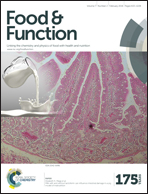Dietary docosahexaenoic acid-enriched glycerophospholipids exert cardioprotective effects in ouabain-treated rats via physiological and metabolic changes
Abstract
Docosahexaenoic acid (DHA) might prevent heart failure or optimise drug treatments by improving cardiac contraction. We investigated whether DHA-enriched avian glycerophospholipids (GPL-DHA) exert cardioprotection in ouabain-treated rats after 4 weeks of dietary supplementation with 10, 35 or 60 mg DHA per kg body weight versus none (DHA10, DHA35, DHA60 and control groups, respectively). The contractile responsiveness to different doses of ouabain (10−7 to 10−4 M), ouabain intoxication (at 3 × 10−4 M), and relative variations in cardiac energy metabolism were determined using 31P NMR in isolated perfused rat hearts. The fatty acid composition of cardiac membranes was analysed by gas chromatography. DHA accretion in the heart was dose-dependent (+8%, +30% and +45% for DHA10, DHA35 and DHA60, respectively). The cardiac phosphocreatine content significantly increased at the baseline in DHA35 (+45%) and DHA60 groups (+85%), and at the different doses of ouabain in the DHA60 group (+73% to 98%). The maximum positive inotropy achieved at 10−4 M ouabain was significantly increased in all DHA groups versus control (+150%, +122.5% and +135% for DHA10, DHA35 and DHA60, respectively), and ouabain intoxication was delayed. The increase in myocardial phosphocreatine content and the improved efficacy of ouabain on myocardial contraction without toxicity suggest the potential of GPL-DHA as a dietary supplement or ingredient for functional food, and possibly as a co-treatment with digitalis drugs in humans.


 Please wait while we load your content...
Please wait while we load your content...